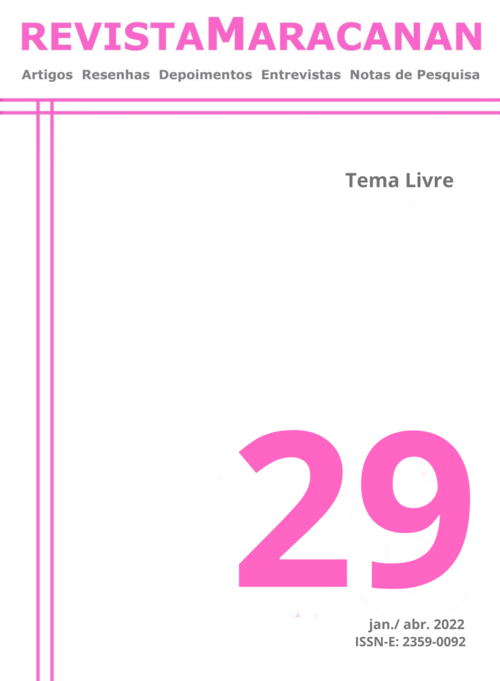Imigrantes Transamazônicos: percepções do regime governamental civil-militar no contexto político de 1970. “Memórias de três imigrantes sobre a Amazônia brasileira”
DOI:
https://doi.org/10.12957/revmar.2022.61230Palabras clave:
Migrações, Transamazônia, Ditadura Militar, TerraResumen
O presente artigo propõe uma reflexão acerca das concepções concernentes ao modo de viver e entender a ditadura civil-militar na década de 70, particularmente na visão de três Migrantes pioneiros, moradores de uma das primeiras agrovilas inaugurada na Rodovia Transamazônica e tendo como período histórico o contexto de construção da estrada no período do regime civil-militar. A metodologia aplicada à proposta e hipótese suscitadas resultou na percepção de que existe, deste/neste corpus, um conjunto peculiar de discursos “positivos” que destoam claramente do que se observa em percepções socio-históricas e até mesmo na “memória oficial” ou nacional que se tem sobra o período mencionado. Concluiu-se que, entre outros fatores, não somente as muitas e profundas dificuldades de um passado longínquo, mas ainda à ausência de um grupo de pertencimento em conjunto com o estranhamento do seu tempo presente e a posse de terra provocaram, nos atores sociais delimitados, uma visão eufêmico-ensimesmada de tudo o que depois desse tempo com eles se passou.
Descargas
Citas
BARTH, Fredrik. Análise da cultura nas sociedades complexas. In O guru, o iniciador e outras variações antropológicas. Rio de Janeiro: Contra Capa, 2000.
CONTINI, Elisio. A Colonização na Transamazônica: um enfoque analítico do plano governamental, seus resultados e problemas. 1976. Tese (Mestrado em Administração Pública) - Escola Brasileira de Administração Pública, Fundação Getúlio Vargas, Rio de Janeiro, 1976.
FOUCAULT, Michel. A Ordem do Discurso. Aula Inaugural no Collège de France, pronunciada em 2 de dezembro de 1970. São Paulo: Loyola, 2009.
IANNI, Octávio. Capitalismo, violência e terrorismo. Rio de Janeiro: Civilização Brasileira, 2004.
LACERDA. Franciane Gama. Migrantes cearenses no Pará: faces da sobrevivência (1889-1916). 2006. Tese (Doutorado em História Social) – Faculdade de Filosofia, Letras e Ciências Humanas, Universidade de São Paulo, São Paulo, 2006.
LESSIO, Thaís Lopes. Leonardo da Vinci, Pará: um olhar sobre a ocupação territorial na rodovia Transamazônica. 2013. Monografia (Graduação em Arquitetura e Urbanismo) - Universidade de São Paulo, São Paulo, 2013.
POLLAK, Michael. Memória, esquecimento, silêncio. Revista Estudos Históricos, Rio de Janeiro, v. 2, n. 3, 1989.
PORTELLI, Alessandro. Narração, interpretação e significado nas memórias e nas fontes orais. Tempo - Revista Digital de História, Niterói (RJ), n. 1, 1996.
SAYAD, Abdelmalek. A imigração ou os paradoxos da Alteridade. São Paulo: EDUSP, 1998.
SILVA, Maria Ivonete Coutinho. Mulheres migrantes na Transamazônica: construção da ocupação e do fazer política. 2008. Tese (Doutorado em Ciências Sociais) – Instituto de Filosofia e Ciências Humanas, Universidade Federal do Pará, Belém, 2008.
SMITH JÚNIOR, Francisco Pereira. Imigração espanhola na Amazônia: as colônias agrícolas e o desenvolvimento socioeconômico do nordeste paraense (1890-1920). 2012. Tese (Doutorado em Desenvolvimento Sustentável do Tropico Úmido) - Núcleo de Altos Estudos Amazônicos, Universidade Federal do Pará, Belém, 2012.
SMITH JÚNIOR, Francisco Pereira. “Inmigración y colonización”: A propaganda da “Amazônia Brasileira” na Espanha. Revista Estudos Amazônicos, v. 6, n. 2, p. 50-75, 2011.
Descargas
Publicado
Cómo citar
Número
Sección
Licencia
Os autores mantêm os direitos autorais e concedem à Revista Maracanan o direito de publicação, sob uma Licença Creative Commons Atribuição 4.0 Internacional, a qual permite que outros distribuam, remixem, adaptem e criem a partir do seu trabalho, mesmo para fins comerciais, desde que lhe atribuam o devido crédito pela criação original.
Os dados e conceitos abordados são da exclusiva responsabilidade do autor.
A Revista Maracanan está licenciada com uma Licença Creative Commons Atribuição 4.0 Internacional.





